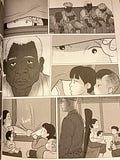College First Year Reading Program: Reading (and Complex Thinking) Not Required
Yet another sign of higher ed deterioration
[Liberal arts college reading material, 2022. Total words: 0, or 1 if you count “fwap”]
The common first year reading for entering students at the university where I’m employed this year was a comic book—or a graphic novel in the Newspeak of our contemporary culture. This one, in which George Takei/Mr. Sulu of Star Trek fame, through a team of ghost wri…


